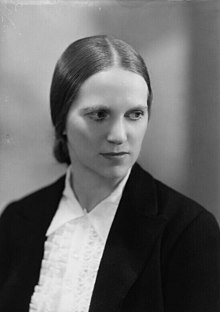
We have seen in a previous Jot how in The Writer magazine Compton Mackenzie told readers about his writing methods. Inspired by this article, the prolific novelist, anarchist, anti-imperialist and pacifist Ethel Mannin (1900 – 84) offered an account in the same magazine of her own working life.
She begins her piece by declaring that she dislikes dictating her work to another person. It’s too much like ‘undressing in public ‘. Dictating machines were around in her time, so it’s odd that she doesn’t mention these. Nevertheless, she admits to preferring to see her words on paper in the form of typing, mainly because she has difficulties on deciphering her own writing. She continues:
‘ In the twenties, when I was a young writer, I liked to emulate Arnold Bennett and keep office hours for work, and for a number of years I did so…, keeping to the 9.30 -6 working day I had know during my four years of office experience. But in those days life was different. Then I was a young married woman with a baby, a resident servant and a husband coming home at seven each evening. By the thirties I was on my own and living a quite different kind of life. A good deal of it was lived in hotels and pensions all over Europe, but still I tried to keep to a regular working day, though the hours began to be more flexible. I hardly know at what point in the forties I turned into the night worker I now inveterately am. Life changed again; resident domestic helped was replaced by daily women two or three times a week—an arrangement by this time , with an increasing liking for solitariness, I much prefer…I live alone—and like it.
The routine now is that I get into the study between ten and eleven in the mornings and am very often still there at midnight. Most of the day until six in the evening in occupied with mail ( like Sir Compton Mackenzie, I deal with about 4,000 letters a year ); then there are six clear hours till midnight for the book I am working on. I seldom continue much after midnight, feeling too mentally tired by then, though not sleepy. I doubt if it is possible to work for more than five or six hours out of the twenty-four on actual writing. On the days when the mail is less I start work—the actual writing, that is—in the afternoon, but then perhaps a guest is coming or supper and I must finish by seven or eight. Even so, I have been eight hours at the typewriter—a full working judges by non-literary standards. Leaving the study around midnight, I read for a while in bed and my bedside light is seldom out before 1 a.m.—often later…
After getting up Mannin found that a refreshing cup of tea at breakfast would ‘reintegrate body and soul, which invariably on waking seem to have become separated, with resultant death-like feelings:
‘ Even as a young woman I was never a one for feeling fine in the mornings. Age seems to have little or nothing to do with it. I have felt-like-death in the mornings as far back as I can remember; by six in the evening I begin to brighten, and by ten or eleven I am fine…usually.’
Like Compton Mackenzie Mannin never gave herself an excuse not to continue with the job in hand.
‘I am often not in the mood, but I don’t surrender to the mood, though I will often postpone, by writing another letter, looking something up or pottering in some way or another, the moment when I must really ‘ get down to it’. Then I take a wild look at the clock, observe how late it is and ‘ get going’….It seems to me that unless one does discipline oneself like that it is impossible to get anything done. Certainly, writing only when one felt like it wouldn’t produce a book. The writing of a book, whether fiction or non-fiction, demands more than imaginativeness and the ability to communicate ideas through the written word; it demands considerable patience and staying power, the capacity for a long-sustained effort.
Mannin then reveals that though she likes to drink, she avoids alcohol when she is writing, eats little while working and has a phobia about radios. Instead she prefers to talk with friends and play recordings of Bach when she has music-loving visitors. Unlike Mackenzie, she doesn’t have ideas for further books after she has finished the book she is writing:
‘ Every time I have finished a novel I feel as though I shall never write again. But sooner or later, after a fallow period—during which time I usually write a few articles and stories—an idea begins to stir in my mind and take shape…’
Mannin confesses that compared to Mackenzie, who wrote one book in a month, she is a bit of a slouch, though she admits to having written Rose and Sylvie in six weeks when living in a pension in the south of France:
‘ Free of domestic and social interruption, I believe I could write most books I set out to write in three or four months; the novel I have just completed, a long book of some 130,000 words, has taken me nine months, but the work was interrupted a good deal in the summer…There can be hard and fast rules in the writing trade, except the relentless one of keeping doggedly at it; even if one achieves only a couple of thousand words or less each working day somehow, it eventually becomes a book.
Mannin wrote these words when she was fifty two years old. She had already published 63 books by then. At her death in 1984 she had written 41 more.
R. M. Healey
‘
